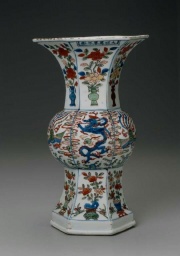Difference between revisions of "Enamel, inorganic"
(username removed) |
|||
| Line 2: | Line 2: | ||
== Description == | == Description == | ||
| − | A hard, vitreous porcelain-like coating on [ | + | A hard, vitreous porcelain-like coating on [[metal]], [[glass]], or [[ceramic]]. Enamel's smooth, shiny surface is made from powdered fusible glasses and opaque colorants (i.e., [[cobalt blue]], [[tin oxide]]) mixed with oil or water, then painted or sprayed on the object and fired up to 800C (1500F). The enamel fuses to the surface of the substrate forming a thin, continuous protective film. Enamel was used by the Greeks in the 4th c. BCE to decorate jewelry and ceramics. Later, artists used enamels to decorate small metal objects, book covers, crosses, and to paint miniature portraits. Low temperature, or soft, opaque enamels are used for coating aluminum for cooking utensils, signs and dials. High temperature, or hard, enamels can be translucent or transparent. Initially the metal bases for enamels were [[gold]] or [[silver]], but [[copper]] was increasingly used in the 18th century for small decorated items such as snuff boxes. Porcelain enamels have been used in building construction since the late 19th century. For architectural enamels, the opaque vitreous coatings were most commonly applied to [[iron]], [[aluminum]], and [[stainless steel]] subtrates. Sheets, panels and tiles were used for interior and exterior surfaces, such as in the White Castle restaurants built in the 1920s. |
[[File:47.1542-SC73111.jpg|thumb|]] | [[File:47.1542-SC73111.jpg|thumb|]] | ||
| + | |||
== Synonyms and Related Terms == | == Synonyms and Related Terms == | ||
Revision as of 09:28, 15 January 2014
Description
A hard, vitreous porcelain-like coating on Metal, Glass, or Ceramic. Enamel's smooth, shiny surface is made from powdered fusible glasses and opaque colorants (i.e., Cobalt blue, Tin oxide) mixed with oil or water, then painted or sprayed on the object and fired up to 800C (1500F). The enamel fuses to the surface of the substrate forming a thin, continuous protective film. Enamel was used by the Greeks in the 4th c. BCE to decorate jewelry and ceramics. Later, artists used enamels to decorate small metal objects, book covers, crosses, and to paint miniature portraits. Low temperature, or soft, opaque enamels are used for coating aluminum for cooking utensils, signs and dials. High temperature, or hard, enamels can be translucent or transparent. Initially the metal bases for enamels were Gold or Silver, but Copper was increasingly used in the 18th century for small decorated items such as snuff boxes. Porcelain enamels have been used in building construction since the late 19th century. For architectural enamels, the opaque vitreous coatings were most commonly applied to Iron, Aluminum, and Stainless steel subtrates. Sheets, panels and tiles were used for interior and exterior surfaces, such as in the White Castle restaurants built in the 1920s.
Synonyms and Related Terms
vitreous enamel; émail vitrifié (Fr.); Emaille (Deut., Ned.); esmalte (Port.); inorgânico (Port.); glass enamel; porcelain enamel; basse-taille; grisaille; Limoges enamel; cloisonné enamel; champlevé enamel; Porcelite; Glasiron Macotta; Mirawall; Porcelok; V-Corr; Veos; Zourite
Hazards and Safety
May crack or shatter if bent.
Additional Information
° Thomas Jester, "Porcelain Enamel", in Twentieth-Century Building Materials, T. Jester (ed.), McGraw-Hill: New York, 1995.
Additional Images
Authority
- Thomas C. Jester (ed.), Twentieth-Century Building Materials, McGraw-Hill Companies, Washington DC, 1995 Comment: Thomas Jester, "Porcelain Enamel"
- The Dictionary of Art, Grove's Dictionaries Inc., New York, 1996 Comment: Marit Guiness Aschan "Enamel"
- Wikipedia, the free encyclopedia, at http://www.wikipedia.com Comment: http://en.wikipedia.org/wiki/Vitreous_enamel (Accessed Nov. 2, 2005)
- Dictionary of Building Preservation, Ward Bucher, ed., John Wiley & Sons, Inc., New York City, 1996
- Ralph Mayer, A Dictionary of Art Terms and Techniques, Harper and Row Publishers, New York, 1969 (also 1945 printing)
- Matt Roberts, Don Etherington, Bookbinding and the Conservation of Books: a Dictionary of Descriptive Terminology, U.S. Government Printing Office, Washington DC, 1982
- G.S.Brady, Materials Handbook, McGraw-Hill Book Co., New York, 1971 Comment: p. 254
- Tom Rowland, Noel Riley, A-Z Guide to Cleaning, Conserving and Repairing Antiques, Constable and Co., Ltd., London, 1981
- Art and Architecture Thesaurus Online, http://www.getty.edu/research/tools/vocabulary/aat/, J. Paul Getty Trust, Los Angeles, 2000


